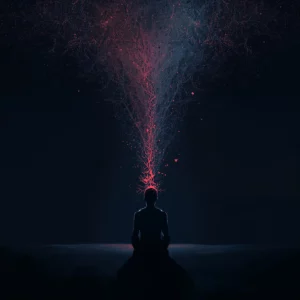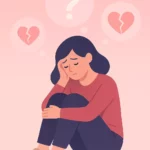Table of Contents
We tell ourselves that if we could just hear them say it—why they left, what went wrong, whether they ever really loved us—it would all make sense. The pain would settle. The questions would stop looping in our heads at 2 a.m.
But the truth is, even when we get that longed-for conversation, it rarely brings emotional closure. Instead, we walk away with a few more answers and a thousand new what-ifs.
We Think Emotional Closure Comes From Them
When a relationship ends, the human brain rebels against unfinished stories. Psychologists call this “the need for cognitive closure”: our innate drive to tie up loose ends and resolve uncertainty.
In love, that need feels amplified because we aren’t just losing a person—we’re losing a version of ourselves, a future we imagined, and a sense of coherence in our world.
It’s no wonder we believe closure must come from outside us. A final talk. An apology. A message that untangles the mess. But studies show this belief can keep us stuck.
Waiting for them to hand you peace is like waiting for rain in a desert.
In one study, participants who understood their breakup reasons did heal better—but that understanding didn’t have to come from their ex. It came from reflection, reframing, and time.

Why “Getting Closure” Rarely Satisfies
Even when we get the answers we crave, something still aches.
That’s because heartbreak isn’t just a mental puzzle to solve—it’s a physiological and emotional upheaval. Your brain is still wired to see them as “home.” Dopamine pathways light up at their memory, oxytocin withdrawal triggers longing, and ambiguous endings—like ghosting—can amplify the hurt for people who need clarity the most.
Studies on emotional closure reveal a hard truth: lingering attachment—not unanswered questions—drives much of the pain. No amount of “Why?” from them can deactivate those attachment circuits. This is why people so often leave “closure conversations” feeling raw instead of relieved.

Why Breakups Hurt So Much (Science of Heartbreak & Healing)
Let’s examine breakups in: Biology of love & loss, Attachment styles, Rejection psychology, Closure, Rumination, Grief
Tap here to read more →
What Emotional Closure Actually Takes
Real closure is not a gift someone else gives you. It’s something you build inside yourself.
- Making sense of the breakup in a way that protects your self-worth, even if you never get their reasons.
- Using cognitive techniques like reappraisal—actively shifting how you view the relationship, its ending, and what it means for your future.
- Accepting ambiguity where answers don’t exist, and focusing instead on what you can control: your healing.
Studies suggest these internal strategies calm the brain’s attachment responses and help us integrate loss into our life story.
Emotional closure is less about shutting the door on the past and more about walking forward—even as it stands slightly ajar.
There’s a quiet power in realizing you don’t have to wait for someone else to free you. You can free yourself.
The answers you thought you needed might never come, but your peace doesn’t depend on them. Emotional closure begins not when they explain why they left—but when you decide you’re ready to stay gone.
FAQ
Q1. What does emotional closure actually mean after a breakup?
Emotional closure is the internal process of making sense of a breakup and finding peace without needing answers or validation from your ex. It involves reframing your thoughts, accepting ambiguity, and consciously letting go of lingering attachment.
Q2. Can I get closure without talking to my ex?
Yes, studies show you don’t need a final conversation to heal. Emotional closure comes from reflecting on the relationship, understanding your feelings, and creating a narrative that supports your growth. Waiting for your ex to provide it can often prolong your pain.
Q3. Why do I still feel stuck even after getting answers from my ex?
Getting answers may satisfy curiosity but rarely heals emotional wounds. That lingering stuck feeling often comes from unresolved attachment and unprocessed grief, which require internal work—not external explanations—to move forward.
Q4. How do I start finding closure on my own?
Start by journaling your breakup story from a self-compassionate perspective, practicing cognitive reappraisal (reframing how you see the breakup), and limiting contact to break attachment cycles. These steps help build emotional closure over time.
Scientific Sources
-
Spencer L. Wrape, Jacqueline Jenkins, et al. (2018): Making Sense and Moving On: The Potential for Individual and Relationship Growth Following Romantic Breakups
Key Finding: Participants who understood the reasons for their breakup showed significantly lower internalizing symptoms and better romantic competence and satisfaction two to three years later.
Why Relevant: Demonstrates that ‘understanding why’—a core piece of closure—is key to healing and moving forward.
https://www.ncbi.nlm.nih.gov/pmc/articles/PMC6051550/ -
Sandra J. E. Langeslag & M. E. Sanchez (2017): Down‑Regulation of Love Feelings After a Romantic Break‑Up: Self‑Report and Electrophysiological Data
Key Finding: Negative reappraisal decreased attachment-related love feelings and lowered brain attention to ex‑partner cues (measured via EEG), while distraction improved mood.
Why Relevant: Offers concrete strategies (‘what it actually takes’) to emotionally detach and regain closure through cognitive techniques.
https://www.researchgate.net/publication/319412724 -
Elisa M. Leckfor et al. (2023): The Relationship Between Ghosting and Closure
Key Finding: Individuals with high need-for-closure experienced greater hurt when ghosted, and ghosting was often used to symbolically ‘end’ ambiguous relationships among those needing closure.
Why Relevant: Highlights that merely ‘ending it’ (even without explanation) doesn’t suffice—psychological need for a clear ending impacts emotional resolution.
https://news.uga.edu/the-relationship-between-ghosting-and-closure/
- Rewriting the Story: The Transformative Power of Self-Closure

- The Ultimate Guide to Emotional Detachment Without Closure

- Closure After a Breakup: The Shocking Truth Experts Reveal

- The Surprising Psychology of Unanswered Questions After a Breakup

- The Healing Power of a Closure Letter: How to Let Go and Move On

- When They Ghost You: A Powerful Guide to Healing and Finding Closure

- Emotional Closure: The Surprising Truth About Letting Go and Moving On

- The Hidden Science of Closure After a Breakup: Why You Crave It and How to Heal


Leave a Reply